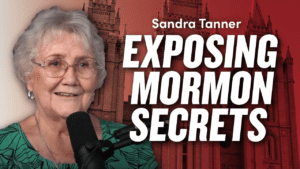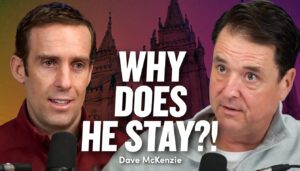I served an LDS mission in Guatemala in the late 1980s. As my mission progressed, we began to average over 700 baptisms per month, with some companionships baptizing over 40 in one month. When I confronted my mission president about the issue–the response wasn’t what I hoped it would be. After returning home, I wrote a letter to Elder Dallin H. Oaks. Today we claim 12+ million in the Church, but truth be told, less than 1/2 of them actually consider themselves Mormon….and thus perhaps the reason why activity rates are so closely guarded.
This PDF includes my full correspondence with Elder Dallin H. Oaks.
Mormon Stories Thanks Our Generous Donors!
Our Platforms:
Social Media:
Contact us:
MormonStories@gmail.com
PO Box 171085, Salt Lake City, UT 84117





23 Responses
John,
Elder Oaks did address the bogus baptism issue within the last 2.5 years or so, but he didn’t use that exact phrase.
President Hinckley addressed the baptism machine too.
Naturually, they both used generic terms so as not to single out anyone, and to make their advice more universally applicable.
Elder Oaks talked about not forcing (though he didn’t use that word) people into baptisms, and to respect their agency about the decision to get baptized. If you’ll search his conference talks in Oct 2002, 2003, or April 2004, you’ll find it. He talked about either to be very careful, or to avoid having goals for a certain number of baptisms since baptism is completely within the agency of the person taking the discussions.
President Hinckley’s talk was either in 2004, or April of 2005. Probably 2004. One of his key words was to avoid using sales techniques. So you could probably use that as a key word.
Personally, I think it is okay, as Elder Packer said in the early 80’s, to use LEGITIMATE “sales techniques” to get people INTERESTED in the gospel, and get them to at least listen to one missionary discussion. But sales techniques, legitimate or not, should not be used to get people in the waters of baptism.
In my mission, in the early 80’s, I experienced similar problems you encountered about missionaries baptizing people who weren’t ready, and in many cases kind of strong-arming, or “brow beating” or emotionally/verbally manipulating them into baptism instead of waiting until they were fully committed.
Many people of South America are very humble, meek and timid, and most of the poor and down-trodden were easy to lead. The missionaries would lead them to baptism, and then move on to new people, and the growth was so fast, that members couldn’t fellowship the converts.
I only saw one attempted child-baptism that was completely inappropriate. Though rumors were rife of it being common.
I was unaware if many of our baptisms were in situations where the person only had one, or none, discussions, and never went to church before being baptized. So it wasn’t as bad as what you described in your mission.
Thanks for the feedback and perspective, GreenEggz.
I’m always glad when I hear these things being addressed/discussed. I know that the bretheren don’t like/support a lot of this that goes on. It’s great to learn about times they’ve tried to teach against it. I hope it continues (I’m sure it will). After speaking with Elder Oaks, I’ve never felt like this was condoned by them….just really hard to stop/guard against. That’s partly why I try to speak up about it….to help build awareness.
Anyway, I value your thoughts. And welcome to MormonStories!!!! Thanks for stopping by!!!
John
It’s always refreshing to see honesty and transparency in the church, such as we see in this podcast. It makes you feel that issues will not be hidden but rather dealt with, and that members will be respected for voicing their concerns about THEIR church. Hopefully that day will come before too many people stray into apostasy.
I think in the podcast you said you were going to post the reply letters from Elder Oaks. Are those somewhere on this site?
Thanks!
I served in the Peru Arequipa mission in 78-80. We had Elders teaching church welfare with the same results… lots of baptisms followed by universal inactivity. Peru was where I first observed the numbers game. Sadly, I saw the same emphasis throughout my tenure in the church. Home teaching percentages, sacrament meeting attendance percentages, temple attendance percentages, etc, etc, etc. It came to look less and less like Christ’s church. I finally resigned, another statistic I’m sure.
As John pointed out, this kind of ‘bad’ baptism practice has been endemic in the missionary program, at least since the baseball/ basketball baptisms of the early 1960’s, which impacted Australia as well as England.
A particularly noxious example was the strongarm ‘Day of Pentecost/ Baptismal Discussion’ program conceived by Elder Loren C. Dunne when he was President of the Australia Sydney Mission in the late 1970s, then spread to the rest of Australia when he moved up a level to Area President (or equivalent). Missionaries faced the same baptismal body count pressures as did John in his mission, with the result that local activity retention rates for converts, after 6 months, dropped below 10%. The high pressure tactics forced on missionaries (such as the ‘Wilford Woodruff’ weeks, where they had to put in 18 hour days door-knocking to meet their tracting goals) did incalculable damage to the image of the Church locally that took years to recover from.
These particular programs were stopped only after an investigation and highly critical report by Joseph McPhie, then of the Church Missionary Dept., who was sent out to take over as Mission President. (I had done several statistical studies on recent convert retention rates, which I provided to him and which I know he made use of.)
What saddens me is that, despite assurances to the contrary, the Church seems entirely unable to prevent these recurrent lapses. This leads me to suspect that they arise out of fundamental flaws in the administration of the current proselyting model.
Excellent podcast. I just heard it today. I can’t imagine how demoralizing that must have been for you at the time.
I’ve heard several similar stories from friends who served missions. I agree with Bob Birks comment that it is an administration issue and would extend it to the stakes as well. I was in one 5 or so years ago where the stake prez told the leadership of a certain ward that he wanted all the members to extend invitations to all their friends to come to the chapel on Christmas Eve and he was going to issue a baptismal challenge for that very evening. He was hoping many would get baptized on the spot. A friend who was there called and told me about it, understandably freaking out. He had served a foreign mission in the mid 80s and had been pressured into tactics like making kids be baptized in order to play baseball.
Evidently, feedback from all parties was very negative and the ward Christmas eve idea was never rolled out. Phew.
I’m on my second stint as a Ward Mission Leader, with 2.3 years in this second calling. My bishop is very missionary minded and huge on goaling baptisms, as is the new stake president. I refuse to participate in goaling baptisms, and told my bishop so several nights ago at my last PPI. This is the third time we have discussed the matter together. He used language this time, however, that he may be releasing me due to my unwillingness to participate in goaling. I remain steadfast and immovable on this issue.
I appreciated the posts and went and read the Ensign article from October 2003, from Dallin H. Oaks about the inappropriateness of goaling something that is largely out of your control because of someone else’s free agency. The full-time missionaries also tell me that Elder Bednar recently spoke at one of their mission meetings and said the same thing when answering a question about goaling baptisms.
I disagree, however with the excuse that this is an administrative matter that the Church is essentially powerless to change. If they wanted it changed, they could change it. I believe that it concerns them, but apparently not enough to do much about.
Can some body please help me find an old article by Paul H Dunn. It has to do with te Word of Wisdom and what happened while he was serving in the army? I think the title of the story is Sargent Iso. It has a sentimental value to me. Please help.
:'( Damn, I can’t stop crying… I was a Missionary. I saw it. I objected to it. I got sent to the worst areas too. 10,000 baptisms a year was the goal in my Mission. What you said is 100% true. It happened to me too. I about threw up when I heard this podcast. Over 25 years and I thought I was alone. No one believed me. I was so lonely on my Mission (I was in South America). My letters to home were intercepted and burned. My letters from home were opened and censored. Considered suicide. Threatened with excommunication if I told. Was told I would never amount to any position in the Church, I would have a mark on my “secret record”, and now it’s become a self-fulfilling prophecy. Now I think I’m going to throw up…
I’m currently an investigator and I’m glad I found this podcast. I do want you to know that the sister missionaries I’ve been speaking with have taken their meetings with me really seriously, they’ve explained the word of wisdom, law of chastity, and I read a chapter of the Book of Mormon between each meeting. I’ve also been to church twice. They’ve asked me to pray and read and let them know what I think. So I think that your podcast has made an impact, at least on some missions. They’ve seemed really sincere. Thank you for sharing this.
Where can I find the documents you referred to : your letter and Dallin Oaks’ “priestcraft” talk?
It’s here, Richard: https://www.mormonstories.org/other/oaksdocs/JohnDehlin-ElderOaksMissionCorrespondance.pdf
Hi John,
I served as a missionary in Guatemala- El Salvador from 1968 to 1970. I am so surprised that many of the practices that you described were going on 10 years prior to your mission. When I arrived to my mission in 1968 our mission president issued “challenges” each month to pairs of missionaries. The first month the “challenge” program was initiated we were to set a goal to find 5 people to baptize. Recognition was given to all sets of companions that met “challenge” by putting their names in the mission monthly newsletter. The district with the most combined baptisms were allowed to go on a “paseo” of their choice. We could rent a van and go to Honduras and see the ruins of Cuban, or many other of those types of paseos that were not normally allowed. Some districts chose to travel from Xela and visit costal areas. The zeal to win a paseo was crazy. As in your mission, the top baptizing set of missionaries “won” a steak dinner at a nice restaurant with the mission president and his wife.
Soon it was nothing to get 5 baptisms a month, so “challenge” was increased to 10 a month for all pairs of missionaries. When 10 was being met easily, then “challenge” went up to 15. By the time I left my mission in 1970, it was common to see 20 to 25 baptisms being performed by pairs of missionaries.
Some of the ways that were suggested to us to reach our goals was to find all inactive members or families and to baptize the children that had reached the age of 8 and had not received baptisms. We called those types of baptisms “candy bappers”. The reasoning behind these baptisms was to reach out and reactivate families and to also get all members baptized. Many of the “challenge” baptisms came from “candy bappers”
The other suggestion given to us was to “challenge” investigators to be baptized after the first lesson or even before receiving a lesson. This was using the “ gift of the Holy Ghost”. If they accepted the challenge to be baptized without the lessons, the members of the branch they went to, or missionaries could fellowship them into the branches.
Another tool we could use, was to invite our district leaders or zone leaders to our lessons and get them to add more support to doubting investigator to accept the challenge of baptism.
The zeal for reaching our “metas” or challenges each month was pretty intoxicating. By the end of my mission, I had reached well over 200 baptisms. I could not take responsibility for the actual baptisms because of course, I did not have the priesthood. I was a lowly Lady Missionary.
It makes me sick to my stomach at this point of my life to realize what I was caught up in. It was like being part of an MLM. I am fascinated that these tactics perpetuated and that 10 years later, you John, were still part of the same MLM. You at least in your naive thinking recognized that it was not right. I am in awe at the light you have brought into the world and that you have made huge dents in “The Church” and their way of thinking and doing business. You could be making so much more money in other areas but you for some reason chose to make a difference by getting stories out to the public. Thank you for accepting this “ challenge”!
This story is very interesting. I served in 2001-2003 in Chile during the time Holland presided over the area and closed down the many wards or stakes you referenced. We spent 50% of our time trying to reactivate people due to the mass baptizing you referenced in years past. There were wards with 1000 members on the roles and less than 100 members going. The rumors of the mass baptism stories still were told but thankfully not practiced that I knew of. Many apostles and prophets visited Chile to try to fix the problems created by the past. It was a weird environment to serve like you were in the Utah of South America with so many supposed Mormons there. Good memories and tough ones but definitely saw the aftermath of what had been done in the 90’s or earlier. There was even a video with Hinckley and others done that I remember watching about no baptizing people 1 day just to have them go out of the Church the next week. It made me question things for sure and wonder what we were doing since things were in such a crazy situation that baptizing another person into the situation things were in seemed uncomfortable. Baptism definitely continued but man it seemed like the whole country needed to be reactivated vs baptizing more.
I served a mission at the same time as John Dehlin, I think. Nov 16, 1988`to May30, 1990 Australia, Adelaide. When I got to my first area we met a family and the parents and son were baptized. We were invited to the mission presidents home to the Baptizers Dinner. I still have the engraved steak knife somewhere. Any missionaries with 3 baptisms in one month were invited to the special dinner. At the time I knew it was an incentive to work but it never occurred to me that this could have been much more. Thank you for the Mormon Stories Podcast. I went to a THRIVE event in Sacramento and that was great too.
Both of my parents served missions.
I remember as a kid in primary that the teacher asked which boys wanted to serve a mission. I excitedly flew my hand in the air. They laughed at me.
Like many my experiences are bittersweet. :)
Thank you
I was an LDS missionary in Germany from 1961-63 during the era of baseball baptisms which as I recall was instituted in Europe when Alvin R. Dyer was President of the European Mission. I specifically recall my months in Mainz when we elders in the city were teaching about a dozen young boys the basics of baseball followed by discussions of the gospel. We tried to do this in their homes with their families, but also taught the boys without families when parents indicated they had no interest but didn’t mind us teaching their boys the gospel. My clear impression was that these boys were mostly from dysfunctional families and that the parents were just happy to have some friendly young American males paying attention to their sons and didn’t really pay much attention to what activities they were involved in.
I was only involved in this program for a few months and have no idea how many baptisms resulted from it although I think one or two boys were baptized in Mainz with the approval of parent who had no interest in the gospel themselves but thought it might be good for their sons to be associated with a church. I’ve subsequently never heard that anyone baptized under the baseball program remained in the church but did hear that the Church later removed many names from the records of people baptized in Europe during that era and who had had no contact with the Church since.
I’ve often wondered whether this baseball baptism program played a role in Alvin R. Dyer future in the Church after he left Europe. As I understand it, he was ordained an apostle and spent some time in the First Presidency but never became a member of the Quorum of the Twelve.
I was a missionary in the Venezuela Caracas mission from 1985-87. Practices like you describe were going on in my mission as well but only in certain areas. Regardless, the pressure to meet monthly baptismal goals throughout the mission was intense and we missionaries carried a lot of guilt because failure to hit goals meant we weren’t working hard enough or had some other personal failing (so we were told). My first mission president was Lavar Skousen. I told him about some of the practices I thought were pretty shady and he told me to just keep quiet about it because he didn’t want to challenge the faith of the missionaries. Soon after this interview I was transferred to a remote location. Anyway, that’s how it was and I suspect similar practices were going on throughout Central and South America at the time.
This disgusts me. As a Mormon woman I was taught to date returned missionaries and now I wish I had been taught to date someone who isn’t just a yes-man or a con-man and someone who actually does the difficult emotional and communicative labor to think for himself. Thank you for this episode John.
Yes! I feel lucky to have served a mission myself so I could break through the indoctrination that “RM” automatically equals “good husband” and that a non-RM would automatically be a bad one. I see so many stories of women in bad Mormon marriages for this, and it’s even sadder when some of them ended relationships with better men because they couldn’t “take them to the Temple” only to end up with an abusive Temple marriage. Hugs to you.